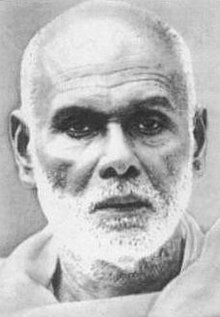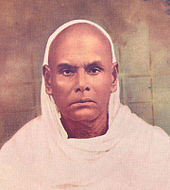Narayana Guru
Narayana Guru | |
|---|---|
 Narayana Guru | |
| Personal | |
| Born | ca. 1854 |
| Died | 20 September 1928 |
| Religion | Hinduism |
Narayana Guru (ca. 1854 – 20 September 1928), was a social reformer of India. He was born into a family of the Ezhava caste in an era when people from such communities, which were regarded as Avarna, faced much injustice in the caste-ridden society of Kerala. He led a reform movement in Kerala, rejected casteism, and promoted new values of spiritual freedom and social equality.[1]
Contents
Biography[edit]
Family and early life[edit]
There are many legends surrounding the life of Narayana Guru but few certain facts until his rise to prominence in 1887. He was born probably in 1854, the son of an Ezhava peasant, Madan Asan and his wife Kuttiyamma, in the village of Chempazhanthy near Thiruvananthapuram. Most likely, he was educated at least in part by a Nair teacher from a nearby village. He was deeply influenced by Vedanta and by ideas of social equality and social and religious reform. He taught religion and Sanskrit to local children and studied yoga with notable ascetics such as Chattampi Swami. He was an itinerant yogi for some time and Cyriac Pullapilly says that he was probably married for a few years but "his worshipful biographers ignored this part of his life out of reverence for his later asceticism".[2][3]
As a youth, Narayana Guru turned away from the temple rituals of his local village and travelled widely, living an ascetic lifestyle and seeking religious understanding. He eventually became a schoolteacher and then a religious reformer.[4]
Sivagiri pilgrimage[edit]
The trio of Vallabhasseri Govindan Vaidyar, T K Kittan Writer, and Mooloor S. Padmanabha Panicker are believed to have conceived the idea of the Sivagiri pilgrimage. Though the proposal was approved by Narayana Guru as early as 1928, it was not until 1932 that the first pilgrimage was undertaken from Elavumthitta in Pathanamthitta District.[5]
Narayana Guru stated the goals of the pilgrimage to be the promotion of education, cleanliness, devotion to God, organization, agriculture, trade, handicrafts, and technical training. He advised Vaidyar and Writer to organise a series of lectures on these themes and stressed the need for the practice of these ideals, stating this to be the core purpose of Sivagiri pilgrimage.

Public acceptance, honours and veneration[edit]
Rabindranath Tagore met Narayana Guru at the latter's ashram in Sivagiri in November 1922. Tagore later said of Narayana Guru that, "I have never come across one who is spiritually greater than Swami Narayana Guru or a person who is at par with him in spiritual attainment".[6]
On 21 August 1967, Narayana Guru was commemorated on an Indian postage stamp of denomination 15 nP.[7] Another commemorative stamp on him was issued by Sri Lanka Post on 4 September 2009.[8]
Both Sri Narayana Jayanthi and Sree Narayana Guru Samadhi are public holidays in Kerala.[9]
Notable disciples[edit]
Depictions[edit]
The life of Narayana Guru has been portrayed in at least four movies: the Malayalam-language films Sree Narayana Guru[12] (1985), and Yugapurushan[13] (2010), the Tulu film Brahmashri Narayana Guru Swamy,[14] (2014) and Marunnumamala.[15]
Works[edit]
In Malayalam[edit]
- Swanubavageethi
- Atmopadesa Śatakam
- Advaitha Deepika
- Arivu
- Daiva Dasakam
- Jeevakarunya Panchakam
- Anukamba Dasakam
- Jathi Nirnayam
- Jathi Lakshanam
- Chijjada Chinthanam
- Daiva vichinthanam – 1 & 2
- Athma Vilasam
- Shiva Shathakam
- Kolatheereshastavam
- Bhadrakaalyashtakam
- Gajendra moksham vanchipattu
- Ottapadyangal
- Sree Krishnana Darsanam
- Mangalasamsakal
- Subramanya Ashtakam
- Sadasiva Darsanam
- Samasya
- Swanubhava Geethi
- Indrya Vairagyam
In Sanskrit[edit]
- Darsana Mala
- Brahmavidya Panchakam
- Nirvruthi Panchakam
- Slokathrayi
- Vedantha Suthram
- Homa Manthram
- Municharya Panchakam
- Asramam
- Dharmam
- Charama Slokangal
- Homa Mantram
- Chidambarashtakam
- Guhashtakam
- Bhadrakaliashtakam
- Vinayaka Ashtakam
- Sree Vasudeva Ashtakam
- Janani Navaratna Manjari
In Tamil[edit]
- Thevarappathinkangal
Translations[edit]
- Thirukural
- Isavasyo Upanishad
- Ozhivil Odukkam
See also[edit]
- Sree Narayana Dharma Sangham
- Temples built by Narayana Guru
- M. C. Joseph
- C. V. Kunhiraman
- Mithavaadi Krishnan
References[edit]
- ^ Pullapilly, Cyriac K. (1976). "The Izhavas of Kerala and their Historic Struggle for Acceptance in the Hindu Society". In Smith, Bardwell L. Religion and social conflict in South Asia. International studies in sociology and social anthropology. 22. BRILL. pp. 24–46. ISBN 978-90-04-04510-1.
- ^ Pullapilly, Cyriac K. (1976). "The Izhavas of Kerala and Their Historic Struggle for Acceptance in the Hindu Society". In Smith, Bardwell L. Religion and Social Conflict in South Asia. Leiden: BRILL. pp. 35–36. ISBN 9789004045101.
The guru was born probably in 1854
- ^ Ramachandran, V. K. (1997). "On Kerala's Development Achievements". In Drèze, Jean; Sen, Amartya. Indian development: selected regional perspectives. Delhi and New York: Oxford University Press. p. 309. ISBN 0-19-829204-X.
- ^ Younger, Paul (2002). Playing host to deity : festival religion in the South Indian tradition. New York: Oxford University Press. p. 127. ISBN 0-19-514044-3.
- ^ "Elavumthitta - the birthplace of Sivagiri pilgrimage". The Hindu. 4 January 2013. Retrieved 19 October 2014.
- ^ Bhattacharya, Sabyasachi (31 December 2011). "The Other Tagore". Frontline (Volume 28 - Issue 27). Retrieved 9 February 2015.
- ^ "Stamps 1947-2000". Postage Stamps. India Post. Retrieved 7 June 2015.
- ^ "All registered stamps issued by Sri Lanka: LK032.09". Universal Postal Union. Retrieved 12 May 2015.
- ^ "Kerala Gazette" (PDF). General Administration (Coordination) Department, Government of Kerala. Retrieved 9 February 2015.
- ^ Das, Sisir Kumar (1991). A History of Indian Literature 1911-1956. Sahitya Akademi. p. 306. ISBN 81-7201-798-7.
- ^ a b Kusuman, K. K. (1990). A Panorama of Indian Culture: Professor A. Sreedhara Menon Felicitation Volume. Mittal Publications, New Delhi. p. 44. ISBN 81-7099-214-1.
- ^ "33rd National Film Awards" (PDF). Directorate of Film Festivals. Retrieved 19 October 2014.
- ^ "Yugapurushan (2010)". IMDb. Retrieved 19 October 2014.
- ^ "Now showing: 50th Tulu movie". The Hindu. 3 May 2014. Retrieved 22 May 2015.
- ^ "Marunnumala Docufiction release on Aug 9 - Maruthwamala". Retrieved 2016-09-22.
Further reading[edit]
- (Re)construction of ‘the Social’ for Making a Modern Kerala: Reflections on Narayana Guru’s Social Philosophy, Satheese Chandra Bose, published in Satheese Chandra Bose and Shiju Sam Varughese (eds.) 2015. Kerala Modernity: Ideas, Spaces and Practices in Transition. Hyderabad: Orient Blackswan.
- Sree Narayana Guruswamikalude jeeva charithram– Moorkoth Kumaran-(The official biography as approved by Sivagiri mutt.) Published by SNDS Trust
- Sree Narayana Gurudeva Krithikal – Sampoorna Vyakyanam – G Balakrishnan Nair- (Works of Sree Narayana Guru with Complete Interpretations – ten parts compiled in two volumes) published by The State Institute of Languages, Kerala.
- Brahmarshi Sree Narayana Guru – Dr. T. Bhaskaran- published by Sahitya Akademi.
- The Word of the Guru : The Life and Teaching of Guru Narayana : Nataraja Guru, D.K. Printworld, 2003, New Delhi, ISBN 81-246-0241-7
- Srinarayana Guruvinte Sampoorna Kruthikal (Complete Works of Sri Narayana Guru): Mathrubhoomi Publishers, Kozhikode, Kerala
- Sri Narayana Guruvinte Mathavum Sivagiriyum (Sivagiri and the Religion of Sri Narayana Guru): K. Maheshwaran Nair
- Narayanaguru- Editor: P.K.Balakrishnan (A collection of essays in Malayalam):March 2000, (First Edition 1954), Kerala Sahitya Academi, Trichur, Kerala.
- The Philosophy of Narayana Guru: Swami Muni Narayana Prasad, D.K. Printworld, 2003, New Delhi, ISBN 81-246-0236-0.
- Sree Narayana Gurudev - the Maharshi who made Advaita a Science - [Prof:G.K.Sasidharan]: Many Worlds Publications, Kollam, Kerala (First Edition 2014)
External links[edit]
| Wikiquote has quotations related to: Narayana Guru |
| Wikimedia Commons has media related to Narayana Guru. |
- Narayana Guru
- 1854 births
- 1928 deaths
- 20th-century Indian philosophers
- Indian reformers
- Advaitin philosophers
- Indian Hindu religious leaders
- Hindu philosophers
- Prophets
- Scholars from Thiruvananthapuram
- Indian social reformers
- 19th-century Hindu religious leaders
- 20th-century Hindu religious leaders
- 20th-century Indian writers
- 19th-century Indian philosophers
- 19th-century Indian writers
- Writers from Thiruvananthapuram
- Indian male writers
- People of the Kingdom of Travancore
- Activists from Kerala



.jpg/170px-Sivagiri_(1).jpg)

